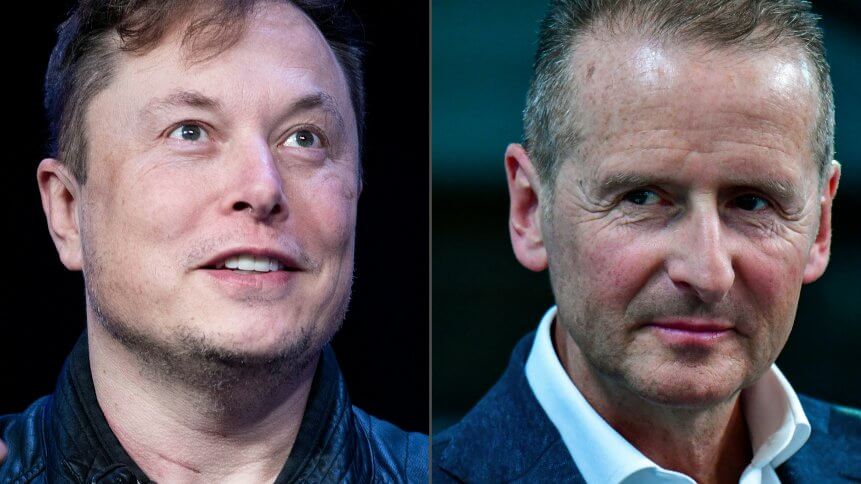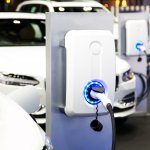Can Volkswagen beat Tesla to conquer the EV market?

- In order to meet EU climate targets and overtake industry leader Tesla, VW plans to launch about 70 purely-electric car models by 2030
- VW also plans to cut the cost of EV batteries — and improve battery efficiency relative to Tesla — by setting up its own battery cell production plants across Europe
- VW is already the top EV seller in Europe
Tesla’s days as the leader of the electric vehicle (EV) pack might be numbered. Last year, the American clean energy company sold just under half a million EVs, taking a 16% share of the global market, down from 17% in 2019. However, while German carmaker Volkswagen (VW) sold about 422,000 – denoting a 13% share – in Q4 2020 alone, VW actually sold the most EVs (191,000) compared with 183,000 for Tesla.
In terms of all-electric car sales, Tesla had a 23% global market share in 2020, more than double VW’s 11% position, though the latter is catching up to the former in the global EV market. The German automaker remains behind Elon Musk’s company in some critical areas, including software according to some analysts, but VW holds an advantage when it comes to experience in scaling up to mass production.
Volkswagen Group’s chief executive Herbert Diess, debuted on Twitter in January with a lighthearted jibe at Tesla’s Elon Musk, writing that the German carmaker was out to capture market share from Tesla after having already conquered the first markets in Europe. The tweet, if anything, succinctly spelled out VW’s desire to dislodge Tesla from its perch as the world’s biggest electric carmaker and to remain a dominant force in a rapidly transforming industry.
Hello @Twitter! I’m here to make an impact with @VWGroup, especially on political issues. And, of course, to get some of your market shares, @elonmusk – after all, our ID.3 and e-tron have won the first markets in Europe. Looking forward to productive discussions!
— Herbert Diess (@Herbert_Diess) January 20, 2021
Volkswagen pursues Tesla highs
Wolfsburg-based VW has been pumping in billions of euros as part of a radical strategic shift towards electric vehicles (EV). The group’s eponymous brand expects all-electric vehicles to account for two-thirds of its total car sales in Europe by 2030, and over half in China and the US. The ambitious EV offensive has firmly put the 83-year-old company on track to overtake electric car market leader Tesla within the next two years.
The group’s pure-electric vehicle sales more than tripled last year to over 230,000, closing the gap with Tesla which delivered just shy of 500,000 vehicles. Volkswagen overtook Tesla as the biggest electric vehicle maker in Europe, selling one in four finished cars in a year that saw EV sales soar – propped up by generous European state subsidies and strict CO2 emission guidelines, incentivizing carmakers to double down on churning out EVs, despite bleeding money selling them.
Some analysts even reckon that there is a 100% chance that VW will overtake Tesla next year, or even this year given the carmaker’s aggressive EV rollout plans. The ID.3 hatchback which hit showrooms in Europe last year will be followed by the ID.4 SUV and the ID.5 crossover in 2021. Seven-seater ID.6 X is also planned to go on sale in China later this year.
The VW Group includes the Porsche, Audi, and Skoda brands, and plans to launch around 70 purely electric models by 2030. 2030 is an important year for “green” cars as that is the date by when the European Commission, the executive branch of the European Union, wants to have at least 30 million zero-emission vehicles on European roads as part of its overall campaign to achieve carbon-neutrality in the EU by 2050. Volkswagen’s ID.3, the company’s first offering from its dedicated electric car platform, beat the Model 3 in December to become the second-bestselling car in Europe less than four months after its launch.
In terms of software and battery fronts, VW trails Tesla and most recently, VW unveiled plans to operate six battery cell factories in Europe by the end of the decade; and 18,000 public battery charging stations on the continent by 2025 (a fivefold increase from its current network). VW will also focus on the development of a “new unified cell” which is slated to be rolled out in 2023 and used in up to 80% of the group’s electric vehicles by 2030.
VW also plans to set up 3,500 charging stations in the US and 17,000 in China. However, some analysts cautioned that VW remains far behind Tesla in terms of its software and battery capabilities, noting that VW currently has a US$1,300 per car cost disadvantage in batteries versus Tesla, and that “this gap is unlikely to be closed due to Tesla’s vertical integration and innovative power.” UBS analysts said, will be the “battleground” for EV supremacy in the future. Meanwhile, VW plans to invest US$19 billion over the next five years to upgrade its digitalization and software capabilities.










